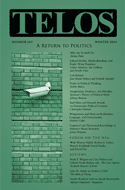Johnny Brennan’s “Imagination, Prophecy, and Morality: The Relevance and Limits of Spinoza’s Theory of Political Myth” appears in Telos 169 (Winter 2014). Read the full version online at the Telos Online website, or purchase a print copy of the issue in our store.
 How should we understand myth in the political realm? Some see myth as a dangerous form of regression that allows its utilizers to reorient the consciousness of a population toward dangerous ends. Others see myth as a necessary spark to incite revolutionary progress; myth brings with it the emotional charge needed to unite a population into action. Yet others see myth as a set of training wheels helpful for grasping more difficult and abstract concepts—training wheels which some are never meant to take off. Spinoza stands unique in that he is able to incorporate all of these dimensions of political myth. His motivating question is not what myth is, but rather what are its legitimate uses. Myth can be progress, but used improperly can also lead to regression. Myth relies on the basest form of knowledge in order to be able to communicate to all people, but cannot last if it is blindly accepted. Myth, for Spinoza, is inseparable from our lives and from society; it is a part of our mental construction and in that manner can be used for progress. But myth also has its limits, and should it surpass those limits it can lead to a culture of superstition that will regress to more primitive forms. Spinoza’s is a more successful theory of political myth because it is more accepting of, and true to, the way myth acts in our individual and social lives.
How should we understand myth in the political realm? Some see myth as a dangerous form of regression that allows its utilizers to reorient the consciousness of a population toward dangerous ends. Others see myth as a necessary spark to incite revolutionary progress; myth brings with it the emotional charge needed to unite a population into action. Yet others see myth as a set of training wheels helpful for grasping more difficult and abstract concepts—training wheels which some are never meant to take off. Spinoza stands unique in that he is able to incorporate all of these dimensions of political myth. His motivating question is not what myth is, but rather what are its legitimate uses. Myth can be progress, but used improperly can also lead to regression. Myth relies on the basest form of knowledge in order to be able to communicate to all people, but cannot last if it is blindly accepted. Myth, for Spinoza, is inseparable from our lives and from society; it is a part of our mental construction and in that manner can be used for progress. But myth also has its limits, and should it surpass those limits it can lead to a culture of superstition that will regress to more primitive forms. Spinoza’s is a more successful theory of political myth because it is more accepting of, and true to, the way myth acts in our individual and social lives.


